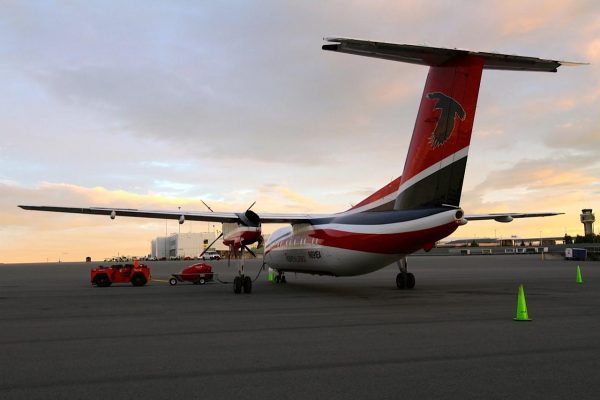
A Juneau-based flight service says that continuing air service to Southwest Alaska communities like the bustling fishing port of Dutch Harbor could be jeopardized unless its bid to buy regional airline PenAir is accepted by its bankrupt parent company, RavnAir Group.
Alaska Seaplanes says that PenAir’s operating certificate is set to expire next month, and if that happens, resurrecting the company could be an expensive and time-consuming process that might not happen before the COVID-19 pandemic subsides and PenAir’s destinations need more flights than are available now.
“We have a very narrow window of opportunity here to have the Ravn bankruptcy end up being a pause rather than a full stop,” Kent Craford, an Alaska Seaplanes co-owner, said in a phone interview Friday. “If we don’t act fast, this small delay and brief grounding is going to turn into a significant cessation of service.”
The Federal Aviation Administration issued PenAir’s operating certificate; an agency spokesman said that the bankruptcy process is ongoing, but he added that the company’s certificate does not expire. The FAA spokesman directed further questions to Alaska Seaplanes.
Craford did not immediately respond to a follow-up request to reconcile his comments about PenAir’s certificate’s expiration with the FAA’s statement that such certificates do not expire.
Ravn officials did not respond to requests for comment.
PenAir flies from Anchorage to destinations like Dutch Harbor and Dillingham, in Bristol Bay. It was purchased in 2018 by RavnAir Group, which last month filed for bankruptcy and suspended its operations, including PenAir’s, amid the coronavirus pandemic.
Ravn is $90 million in debt and could be forced to shut down for good, court docs say
PenAir holds a “Part 121” certificate that, under FAA rules, allows it to offer regularly scheduled air service. Such certificates are difficult and costly to obtain, and PenAir’s is set to lapse and become worthless in early June unless its planes return to the air, Craford said.
Craford said the FAA had previously granted PenAir a one-month extension to its certificate, but he said it’s not clear that the agency will grant another.
Ravn is Alaska’s largest rural airline, and it flew to more than 100 destinations across the state before filing for bankruptcy in early April. At the time, the company was $90 million in debt, and it has since filed a plan to sell its assets to pay off its lenders.
While Ravn flew dozens of planes under a single brand, it actually consists of three separate airlines.
PenAir is one. Another is Corvus Airlines, which flew bigger planes between Anchorage and rural hub destinations like Bethel, Homer and Unalakleet. The third is Hageland Aviation Services, which flew smaller planes between those rural hubs and more isolated villages.
Ravn’s model allowed passengers to use a single online platform to book flights on multiple airlines between Anchorage and villages.
But critics said that the company, which is majority-owned by a pair of East Coast private equity firms, was often unresponsive to local concerns. And now that Ravn has suspended service, an array of smaller operators has started filling in service gaps.
RELATED: When Ravn stopped flying, these airlines stepped in
As the bankruptcy plays out, Craford, with Alaska Seaplanes, said that selling off Ravn’s assets — like PenAir’s operating certificate — is the best way to generate cash to pay off the company’s creditors. But he said he’s concerned that the company’s chief executive, Dave Pflieger, is slowing down that process by trying to secure investment to keep Ravn alive.
“Ravn is dead. Any chance at resurrecting it has passed, and any intent to do so is a fool’s errand,” Craford said. “Any investor worth their salt is not going to throw money at trying to put Humpty Dumpty back together again and get Ravn in its former configuration back in the air. It’s just not going to happen — it was a failed model.”
Ravn has been seeking coronavirus-related aid from the Trump administration, and it’s in line to receive $30 million in grants and $5 million in loans from the U.S. Treasury Department if it finds a buyer that will continue operating the company as a “going concern,” Ravn said in a bankruptcy filing Thursday. It also reported hiring an influential Anchorage-based lobbyist, Ashley Reed, last week, for $5,000 a month.
Pflieger, who was paid $1.4 million in salary, bonuses and expenses last year, according to bankruptcy filings, did not respond to a request for comment.
PenAir is a venerable Alaska airline that was founded by Orin Seybert in the 1950s. It grew into a major regional air carrier before expanding to the East Coast and making its own bankruptcy filing in 2018, when it was purchased by Ravn.
Alaska Seaplanes’ current bid for PenAir is in collaboration with a Connecticut investment firm, Wexford Capital, that also participated in the 2018 bankruptcy auction.
Alaska Seaplanes’ bid is for all of PenAir’s assets, though those include little beyond the company’s operating certificate, as it leases the Saab 2000 aircraft that it flies, Craford said.
Ravn said in bankruptcy filings that the Saabs were unprofitable to operate even before the coronavirus pandemic, but Craford said his company plans to continue to use them.




